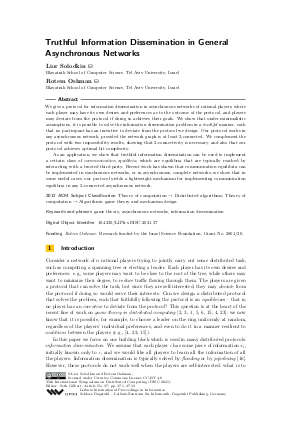Truthful Information Dissemination in General Asynchronous Networks
Authors Lior Solodkin, Rotem Oshman
-
Part of:
Volume:
35th International Symposium on Distributed Computing (DISC 2021)
Part of: Series: Leibniz International Proceedings in Informatics (LIPIcs)
Part of: Conference: International Symposium on Distributed Computing (DISC) - License:
 Creative Commons Attribution 4.0 International license
Creative Commons Attribution 4.0 International license
- Publication Date: 2021-10-04
File

PDF
LIPIcs.DISC.2021.37.pdf
- Filesize: 0.61 MB
- 19 pages
Document Identifiers
Subject Classification
ACM Subject Classification
- Theory of computation → Distributed algorithms
- Theory of computation → Algorithmic game theory and mechanism design
Keywords
- game theory
- asynchronous networks
- information dissemination
Metrics
- Access Statistics
-
Total Accesses (updated on a weekly basis)
0PDF Downloads0Metadata Views
Abstract
We give a protocol for information dissemination in asynchronous networks of rational players, where each player may have its own desires and preferences as to the outcome of the protocol, and players may deviate from the protocol if doing so achieves their goals. We show that under minimalistic assumptions, it is possible to solve the information dissemination problem in a truthful manner, such that no participant has an incentive to deviate from the protocol we design. Our protocol works in any asynchronous network, provided the network graph is at least 2-connected. We complement the protocol with two impossibility results, showing that 2-connectivity is necessary, and also that our protocol achieves optimal bit complexity. As an application, we show that truthful information dissemination can be used to implement a certain class of communication equilibria, which are equilibria that are typically reached by interacting with a trusted third party. Recent work has shown that communication equilibria can be implemented in synchronous networks, or in asynchronous, complete networks; we show that in some useful cases, our protocol yields a lightweight mechanism for implementing communication equilibria in any 2-connected asynchronous network.
Cite As Get BibTex
Lior Solodkin and Rotem Oshman. Truthful Information Dissemination in General Asynchronous Networks. In 35th International Symposium on Distributed Computing (DISC 2021). Leibniz International Proceedings in Informatics (LIPIcs), Volume 209, pp. 37:1-37:19, Schloss Dagstuhl – Leibniz-Zentrum für Informatik (2021)
https://doi.org/10.4230/LIPIcs.DISC.2021.37
BibTex
@InProceedings{solodkin_et_al:LIPIcs.DISC.2021.37,
author = {Solodkin, Lior and Oshman, Rotem},
title = {{Truthful Information Dissemination in General Asynchronous Networks}},
booktitle = {35th International Symposium on Distributed Computing (DISC 2021)},
pages = {37:1--37:19},
series = {Leibniz International Proceedings in Informatics (LIPIcs)},
ISBN = {978-3-95977-210-5},
ISSN = {1868-8969},
year = {2021},
volume = {209},
editor = {Gilbert, Seth},
publisher = {Schloss Dagstuhl -- Leibniz-Zentrum f{\"u}r Informatik},
address = {Dagstuhl, Germany},
URL = {https://drops.dagstuhl.de/entities/document/10.4230/LIPIcs.DISC.2021.37},
URN = {urn:nbn:de:0030-drops-148398},
doi = {10.4230/LIPIcs.DISC.2021.37},
annote = {Keywords: game theory, asynchronous networks, information dissemination}
}
Author Details
Funding
- Oshman, Rotem: Research funded by the Israel Science Foundation, Grant No. 2801/20.
References
-
Ittai Abraham, Danny Dolev, Ivan Geffner, and Joseph Y. Halpern. Implementing mediators with asynchronous cheap talk. In PODC 2019, pages 501-510, 2019.

-
Ittai Abraham, Danny Dolev, Rica Gonen, and Joe Halpern. Distributed computing meets game theory: Robust mechanisms for rational secret sharing and multiparty computation. In PODC 2006, pages 53-62, 2006.

-
Ittai Abraham, Danny Dolev, and Joseph Y Halpern. Lower bounds on implementing robust and resilient mediators. In TCC 2008, pages 302-319, 2008.

-
Ittai Abraham, Danny Dolev, and Joseph Y. Halpern. Distributed protocols for leader election: A game-theoretic perspective. ACM Trans. Economics and Comput., 7(1):4:1-4:26, 2019.

-
Yehuda Afek, Yehonatan Ginzberg, Shir Landau Feibish, and Moshe Sulamy. Distributed computing building blocks for rational agents. In PODC 2014, pages 406-415, 2014.

-
Yehuda Afek, Shaked Rafaeli, and Moshe Sulamy. The role of a-priori information in networks of rational agents. In DISC 2018, pages 5:1-5:18, 2018.

-
Mor Amitai. Cheap-talk with incomplete information on both sides. Discussion paper 90, Center for Rationality, The Hebrew University of Jerusalem, 1996.

-
Itai Ashlagi, Dov Monderer, and Moshe Tennenholtz. On the value of correlation. J. Artif. Int. Res., 33(1):575-613, 2008.

-
Robert J. Aumann. Subjectivity and correlation in randomized strategies. Journal of Mathematical Economics, 1(1):67-96, 1974.

-
Elchanan Ben-Porath. Cheap talk in games with incomplete information. J. Economic Theory, 108(1):45-71, 2003.

-
Arkadev Chattopadhyay, Jaikumar Radhakrishnan, and Atri Rudra. Topology matters in communication. In FOCS 2014, pages 631-640, 2014.

-
Francoise Forges. An approach to communication equilibria. Econometrica, 54(6):1375-1385, 1986.

-
Joseph Halpern and Vanessa Teague. Rational secret sharing and multiparty computation. In STOC 2004, pages 623-632, 2004.

-
Joseph Y Halpern and Xavier Vilaça. Rational consensus. In PODC 2016, pages 137-146, 2016.

-
Itay Harel, Amit Jacob-Fanani, Moshe Sulamy, and Yehuda Afek. Consensus in Equilibrium: Can One Against All Decide Fairly? In OPODIS 2019, pages 20:1-20:17, 2019.

-
Juraj Hromkovič, Claus-Dieter Jeschke, and Burkhard Monien. Optimal algorithms for dissemination of information in some interconnection networks. Algorithmica, 10(1):24-40, 1993.

-
Sergei Izmalkov, Silvio Micali, and Matt Lepinski. Rational secure computation and ideal mechanism design. In FOCS 2015, pages 585-594, 2015.

-
David M Kreps and Robert Wilson. Sequential equilibria. Econometrica: Journal of the Econometric Society, pages 863-894, 1982.

-
Matt Lepinski, Silvio Micali, Chris Peikert, and Abhi Shelat. Completely fair sfe and coalition-safe cheap talk. In PODC 2004, pages 1-10, 2004.

-
Merav Parter and Eylon Yogev. Secure distributed computing made (nearly) optimal. In PODC 2019, pages 107-116, 2019.

-
Ryan M. Rogers and Aaron Roth. Asymptotically truthful equilibrium selection in large congestion games. In Proceedings of the Fifteenth ACM Conference on Economics and Computation, EC '14, pages 771-782, 2014.

-
R. W. Rosenthal. A class of games possessing pure-strategy Nash equilibria. International Journal of Game Theory, 2:65-67, 1973.

-
Assaf Yifrach and Yishay Mansour. Fair leader election for rational agents in asynchronous rings and networks. In PODC 2018, pages 217-226, 2018.

